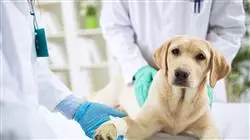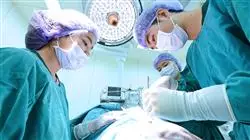University certificate
The world's largest faculty of veterinary medicine”
Introduction to the Program
Thanks to this intensive program you will learn how to correctly manage possible surgical and postoperative complications"

This education addresses the most common surgical diseases of the liver and spleen, as well as the treatment indicated for the most common hernias in the small animal clinic. Due to the fragility of the liver, hemorrhage is one of the most frequent complications of liver surgery due to the possible alteration of hemostasis due to the underlying pathology and its vascular supply. In addition, the management of the liver is complicated due to the limited space and visibility as well as complex in its own and adjacent structures.
Also shown are the major surgical diseases of the head and neck that are often considered challenging for most surgeons. The complex anatomy and characteristics of these diseases make it necessary to have an accurate clinical diagnosis, since an inadequate intervention could have a high cost for the patient.
Finally, the student will learn about surgery of the thoracic cavity, since it is one of the specialties that usually requires the veterinary surgeon to perform. During this Postgraduate diploma, it is intended that the student will broaden their understanding of the pathophysiology of the different diseases that can occur in the thoracic cavity.
After completing this Postgraduate diploma, the student will have sufficient knowledge to deal with any surgery that may arise in these areas. They will know from the first moment everything that a surgery entails, from the specific material and instruments for each region or surgery, anesthetics and medications used, to the most specific details that make a surgery a success.
If you want to advance your career, this is the perfect opportunity. Study this Postgraduate Diploma with us in Advanced Surgery in Small Animals and increase your skills"
This Postgraduate diploma in Advanced Surgery in Small Animals contains the most complete and up-to-date educational program on the market. The most important features include:
- The development of case studies presented by experts in Advanced Surgery in Small Animals
- The graphic, schematic, and practical contents with which they are created, provide scientific and practical information on the disciplines that are essential for professional development
- Latest developments in Advanced Surgery in Small Animals
- Practical exercises where self-assessment can be used to improve learning
- Special emphasis on innovative methodologies in Advanced Surgery in Small Animals
- Theoretical lessons, questions to the expert, debate forums on controversial topics, and individual reflection assignments
- Content that is accessible from any fixed or portable device with an Internet connection
This Postgraduate diploma is the best investment you can make in selecting a refresher program to bring your knowledge of Advanced Surgery in Small Animals up to date"
It includes in its teaching staff, professionals belonging to the field of Veterinary Surgery, who pour into this education the experience of their work, in addition to recognized specialists of leading societies and prestigious universities.
The multimedia content, developed with the latest educational technology, will provide the professional with situated and contextual learning, i.e., a simulated environment that will provide immersive learning programmed to train in real situations.
This program is designed around Problem-Based Learning, whereby the specialist must try to solve the different professional practice situations that arise throughout the program. To do so, the professional will be assisted by an innovative system of interactive videos made by leading experts in Advanced Surgery in Small Animals.
This program comes with the best educational material, providing you with a contextual approach that will facilitate your learning"

This 100% online Postgraduate diploma will allow you to combine your studies with your professional work while expanding your knowledge in this field"
Why study at TECH?
TECH is the world’s largest online university. With an impressive catalog of more than 14,000 university programs available in 11 languages, it is positioned as a leader in employability, with a 99% job placement rate. In addition, it relies on an enormous faculty of more than 6,000 professors of the highest international renown.

Study at the world's largest online university and guarantee your professional success. The future starts at TECH”
The world’s best online university according to FORBES
The prestigious Forbes magazine, specialized in business and finance, has highlighted TECH as “the world's best online university” This is what they have recently stated in an article in their digital edition in which they echo the success story of this institution, “thanks to the academic offer it provides, the selection of its teaching staff, and an innovative learning method aimed at educating the professionals of the future”
A revolutionary study method, a cutting-edge faculty and a practical focus: the key to TECH's success.
The most complete study plans on the university scene
TECH offers the most complete study plans on the university scene, with syllabuses that cover fundamental concepts and, at the same time, the main scientific advances in their specific scientific areas. In addition, these programs are continuously being updated to guarantee students the academic vanguard and the most in-demand professional skills. In this way, the university's qualifications provide its graduates with a significant advantage to propel their careers to success.
TECH offers the most comprehensive and intensive study plans on the current university scene.
A world-class teaching staff
TECH's teaching staff is made up of more than 6,000 professors with the highest international recognition. Professors, researchers and top executives of multinational companies, including Isaiah Covington, performance coach of the Boston Celtics; Magda Romanska, principal investigator at Harvard MetaLAB; Ignacio Wistumba, chairman of the department of translational molecular pathology at MD Anderson Cancer Center; and D.W. Pine, creative director of TIME magazine, among others.
Internationally renowned experts, specialized in different branches of Health, Technology, Communication and Business, form part of the TECH faculty.
A unique learning method
TECH is the first university to use Relearning in all its programs. It is the best online learning methodology, accredited with international teaching quality certifications, provided by prestigious educational agencies. In addition, this disruptive educational model is complemented with the “Case Method”, thereby setting up a unique online teaching strategy. Innovative teaching resources are also implemented, including detailed videos, infographics and interactive summaries.
TECH combines Relearning and the Case Method in all its university programs to guarantee excellent theoretical and practical learning, studying whenever and wherever you want.
The world's largest online university
TECH is the world’s largest online university. We are the largest educational institution, with the best and widest online educational catalog, one hundred percent online and covering the vast majority of areas of knowledge. We offer a large selection of our own degrees and accredited online undergraduate and postgraduate degrees. In total, more than 14,000 university degrees, in eleven different languages, make us the largest educational largest in the world.
TECH has the world's most extensive catalog of academic and official programs, available in more than 11 languages.
Google Premier Partner
The American technology giant has awarded TECH the Google Google Premier Partner badge. This award, which is only available to 3% of the world's companies, highlights the efficient, flexible and tailored experience that this university provides to students. The recognition as a Google Premier Partner not only accredits the maximum rigor, performance and investment in TECH's digital infrastructures, but also places this university as one of the world's leading technology companies.
Google has positioned TECH in the top 3% of the world's most important technology companies by awarding it its Google Premier Partner badge.
The official online university of the NBA
TECH is the official online university of the NBA. Thanks to our agreement with the biggest league in basketball, we offer our students exclusive university programs, as well as a wide variety of educational resources focused on the business of the league and other areas of the sports industry. Each program is made up of a uniquely designed syllabus and features exceptional guest hosts: professionals with a distinguished sports background who will offer their expertise on the most relevant topics.
TECH has been selected by the NBA, the world's top basketball league, as its official online university.
The top-rated university by its students
Students have positioned TECH as the world's top-rated university on the main review websites, with a highest rating of 4.9 out of 5, obtained from more than 1,000 reviews. These results consolidate TECH as the benchmark university institution at an international level, reflecting the excellence and positive impact of its educational model.” reflecting the excellence and positive impact of its educational model.”
TECH is the world’s top-rated university by its students.
Leaders in employability
TECH has managed to become the leading university in employability. 99% of its students obtain jobs in the academic field they have studied, within one year of completing any of the university's programs. A similar number achieve immediate career enhancement. All this thanks to a study methodology that bases its effectiveness on the acquisition of practical skills, which are absolutely necessary for professional development.
99% of TECH graduates find a job within a year of completing their studies.
Postgraduate Diploma in Advanced Surgery in Small Animals
For those veterinary professionals who wish to acquire advanced skills in small animal surgery, there is the Postgraduate Diploma in Advanced Surgery in Small Animals, offered by TECH Global University. This program offers a high-quality online postgraduate program with a focus on advanced small animal surgery and is designed to help veterinarians develop their skills and knowledge to provide quality surgical care to their patients.Veterinarians participating in this program will learn the latest techniques and tools to perform highly complex surgical procedures, such as advanced orthopedic surgery, reconstructive surgery and surgical oncology. They will also learn how to perform proper preoperative and postoperative assessment, and how to manage surgical complications and risks.The Postgraduate Diploma in Advanced Surgery in Small Animals program is delivered completely online, which allows participants to access the course content and materials from anywhere and at any time. In addition, the program counts with a team of highly qualified professionals with extensive experience in the field of small animal surgery.
Delve into veterinary surgery
Program participants will have the opportunity to interact with other veterinary professionals from around the world and share experiences and knowledge in a collaborative virtual learning environment. They will also have access to a wide variety of support resources, including state-of-the-art diagnostic and treatment tools. In short, the Postgraduate Diploma in Advanced Surgery in Small Animals is an excellent choice for veterinarians who wish to expand their knowledge and skills in small animal surgery and provide their patients with high-quality surgical care. With a focus on practical and theoretical training, participants will be able to develop advanced surgical skills and increase their ability to provide quality care to their patients.







